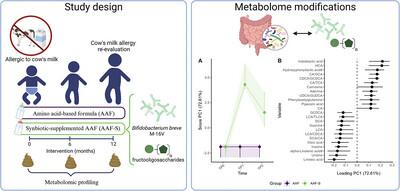Exploring the Fecal Metabolome in Infants With Cow's Milk Allergy: The Distinct Impacts of Cow's Milk Protein Tolerance Acquisition and of Synbiotic Supplementation
Abstract
Scope
Cow's milk allergy (CMA) is one of the most prevalent food allergies in early childhood, often treated via elimination diets including standard amino acid-based formula or amino acid-based formula supplemented with synbiotics (AAF or AAF-S). This work aimed to assess the effect of cow's milk (CM) tolerance acquisition and synbiotic (inulin, oligofructose, Bifidobacterium breve M-16 V) supplementation on the fecal metabolome in infants with IgE-mediated CMA.
Methods and Results
The CMA-allergic infants received AAF or AAF-S for a year during which fecal samples were collected. The samples were subjected to metabolomics analyses covering gut microbial metabolites including SCFAs, tryptophan metabolites, and bile acids (BAs). Longitudinal data analysis suggested amino acids, BAs, and branched SCFAs alterations in infants who outgrew CMA during the intervention. Synbiotic supplementation significantly modified the fecal metabolome after 6 months of intervention, including altered purine, BA, and unsaturated fatty acid levels, and increased metabolites of infant-type Bifidobacterium species: indolelactic acid and 4-hydroxyphenyllactic acid.
Conclusion
This study offers no clear conclusion on the impact of CM-tolerance acquisition on the fecal metabolome. However, our results show that 6 months of synbiotic supplementation successfully altered fecal metabolome and suggest induced bifidobacteria activity, which subsequently declined after 12 months of intervention.



 求助内容:
求助内容: 应助结果提醒方式:
应助结果提醒方式:


